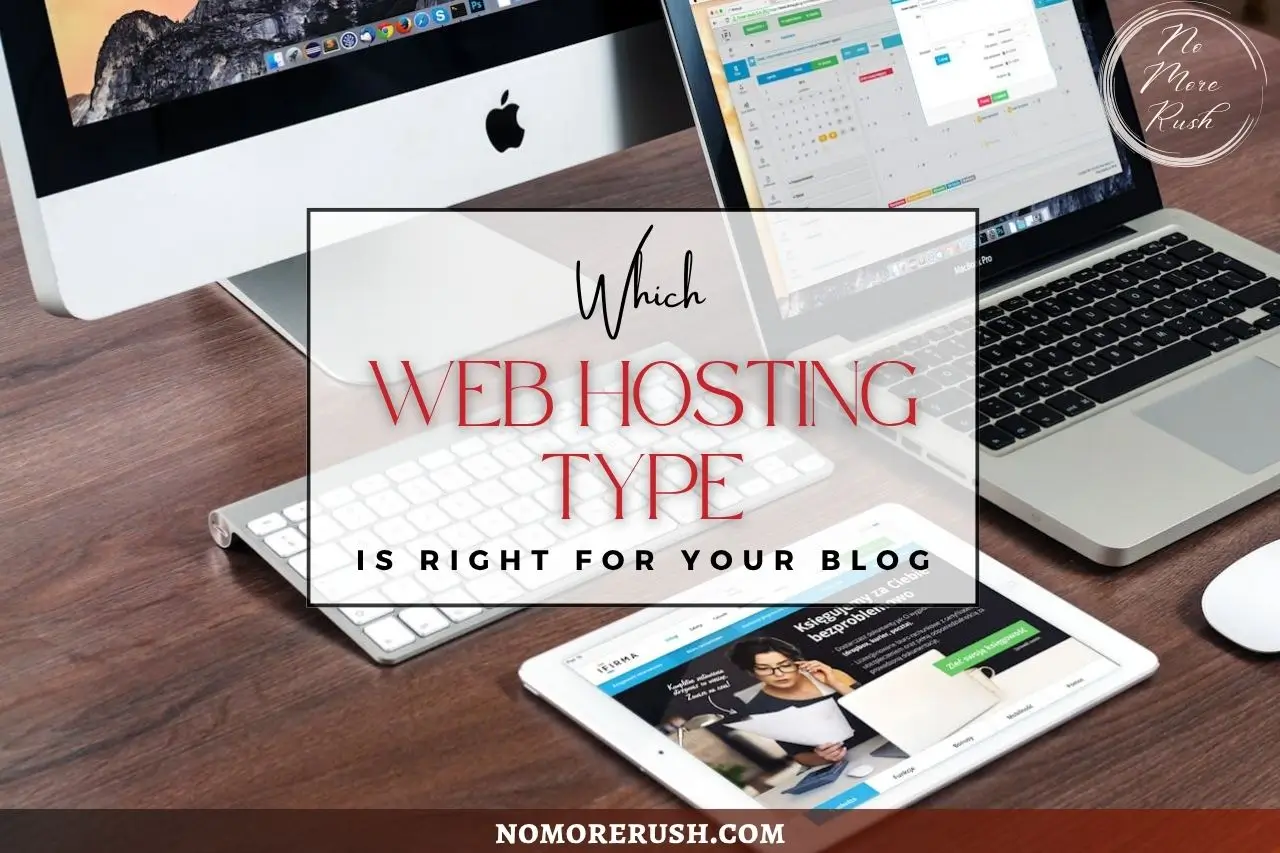When you’re a blogging beginner just starting a blog, one of the first questions you’re probably asking yourself is which web hosting type is right for your blog. With several different types to choose from, picking the right plan might feel like decoding tech jargon you didn’t sign up for. Shared? Managed? VPS? Cloud? It all sounds… expensive and confusing, but it doesn’t have to be.
Think of hosting like renting a space for your blog to live on the internet. Just like renting an apartment or office, there are different types of spaces (some small, some fancy, some private, some shared). The key is picking the one that fits where you are now, not where you think you might be 5 years down the line.
In this post, I’ll walk you through the different types of hosting, what they are, what they roughly cost, and which one makes the most sense for beginner bloggers who want to grow smart and keep things simple.
So let’s make some sense of blog hosting and break this down.
1. Shared Hosting: Budget-Friendly & Beginner-Approved
Shared hosting is like living in an apartment building. You’ve got your own unit (your blog), but you’re sharing the same building resources (like electricity, water, and internet) with all your neighbours, aka, other websites on the same server.
It’s the most common and affordable hosting option for new bloggers, especially when you’re just getting started and don’t have thousands of visitors (yet!).
Pros:
- Super affordable – often $2–$5/month to start.
- Beginner-friendly setup (many hosts offer 1-click WordPress installs).
- Great for low-traffic blogs and small websites.
Cons:
- Since you’re sharing server resources, your site might slow down if one of your “neighbours” gets a traffic spike.
- Limited performance and scalability.
- Less control over technical settings (but that’s a pro if you don’t want to touch code!).
Best For:
New bloggers on a budget who want something simple and low-maintenance to get started quickly.
Key Takeaway:
Shared hosting is perfect for beginners who want to launch their blog without spending a fortune. Just know that as your blog grows, you may outgrow it – and that’s a good thing!
2. Managed WordPress Hosting: Hassle-Free & High-Performance
Managed WordPress hosting is like having a personal tech assistant for your blog. The server is specifically optimised for WordPress, and the hosting provider takes care of all the technical stuff, like backups, updates, security, and speed, so you don’t have to.

It’s a bit more expensive than shared hosting, but you’re paying for ease, speed, and peace of mind.
Pros:
- Super fast and optimised for WordPress out of the box.
- Automatic updates, backups, and security patches.
- Amazing support from WordPress experts.
- Fewer performance issues compared to shared hosting.
Cons:
- Higher price tag (usually $15–$30/month to start).
- Often limits which plugins you can install (for security/duplication/performance reasons).
- Only works with WordPress sites (not for other platforms).
Best For:
Bloggers who want a hands-off experience so they can concentrate more on their content and are ready to invest in performance, security, and ease, without worrying about all the techy stuff.
Key Takeaway:
Managed WordPress hosting is ideal if you want your blog to run smoothly without dealing with the behind-the-scenes tech stuff. It’s a smart next step once your blog starts to grow or if you just want the premium experience from day one.
3. VPS Hosting: More Power, More Control
VPS stands for Virtual Private Server. Think of it as a middle ground between shared and dedicated hosting. Your site still shares a physical server with others, but it’s partitioned into separate “virtual” environments, meaning you get your own dedicated slice of the resources.

advertisement
It’s faster and more customisable than shared hosting, but doesn’t require the full expense of a dedicated server.
Pros:
- More reliable performance – fewer slowdowns during traffic spikes.
- Greater control and customisation options.
- Better security compared to shared hosting.
- Scalable – easier to upgrade as your blog grows.
Cons:
- More expensive than shared hosting (usually $20–$80/month).
- Not beginner-friendly – often requires technical know-how.
- You might need to manage your own server settings or hire help.
Best For:
Experienced bloggers or those running high-traffic blogs who need more control and don’t mind a little technical learning (or outsourcing it).
Key Takeaway:
VPS hosting gives your blog its own “space to grow” with more power and flexibility, but it’s best suited for those who are comfortable handling some tech, or who have someone who can help them with it.
4. Dedicated Hosting: The VIP Experience
With dedicated hosting, you get the entire server all to yourself. No sharing. No virtual partitions. Just you and your blog living the high life with maximum resources and total control.

It’s like renting out an entire building instead of just an apartment.
Pros:
- Full control over everything: settings, security, software, and performance.
- Super reliable, even with very high traffic.
- Maximum speed and uptime.
- Excellent for complex sites or large-scale blogs.
Cons:
- Expensive – often $80–$300+ per month.
- Overkill for small or new blogs.
- You’ll likely need server management skills (or need to pay someone who has them).
Best For:
Established bloggers, businesses, or media-heavy sites with thousands of daily visitors and custom backend needs.
Key Takeaway:
Dedicated hosting gives you full ownership and top-tier performance, but unless your blog is booming, it’s probably more than you need (and want to pay for).
5. Cloud Hosting: Scalable and Smart
Cloud hosting uses a network of servers working together to host your blog. Instead of relying on a single physical server, your blog taps into a virtual pool of resources across many machines.
advertisement
Think of it like Netflix for web hosting – flexible, scalable, and always on.
Pros:
- Highly scalable – great for blogs that get traffic spikes.
- Excellent uptime and reliability.
- You only pay for the resources you use.
- Can be faster and more secure than shared hosting.
Cons:
- Can be more expensive than traditional hosting if not managed carefully.
- Not as beginner-friendly – some platforms require technical know-how.
- Pricing can be unpredictable depending on usage.
Best For:
Growing blogs, ecommerce sites, or anyone who needs flexible performance and expects fluctuating traffic.
Key Takeaway:
Cloud hosting gives your blog room to grow, with power and flexibility that adapts to your needs (and traffic), but you may need some technical know-how.
6. Free Hosting: Tempting But Tricky
Free hosting platforms let you start a blog at zero cost, usually with a subdomain (like yourblog.wordpress.com or yourblog.blogspot.com).

It’s a no-commitment way to dip your toes into blogging before fully committing to it.
Pros:
- It’s free – no upfront costs at all.
- Good for hobby bloggers or testing ideas.
- No need to worry about technical setup or maintenance.
Cons:
- Limited control and customisation.
- You don’t fully “own” your blog (the host can shut it down or show ads, which they make money from).
- No custom domain unless you upgrade.
- Not ideal if you’re serious about growing or monetising your blog.
Best For:
Total beginners testing the waters or hobby bloggers who don’t plan to monetise.
Key Takeaway:
Free hosting is fine for practice, but not for growth. Upgrade when you’re ready to build a brand or make money blogging.
Which Hosting Type Is Right for You?
Choosing the right hosting type depends on your goals, budget, and tech confidence. Here’s a quick cheat sheet to help you decide:
| Hosting Type | Best For | Cost | Ease of Use | Performance | Good For Beginners? |
| Shared | New bloggers, low budget | $ | ⭐⭐⭐⭐ | ⭐⭐ | ✅ |
| Managed WP | WordPress users, hands-off | $$$ | ⭐⭐⭐⭐⭐ | ⭐⭐⭐⭐ | ✅ |
| VPS | Growing sites | $$$ | ⭐⭐⭐ | ⭐⭐⭐⭐ | ❌ (unless tech-savvy) |
| Dedicated | Big sites, full control | $$$$$ | ⭐⭐ | ⭐⭐⭐⭐⭐ | ❌ |
| Cloud | Scalable projects | $$$ | ⭐⭐⭐ | ⭐⭐⭐⭐ | ✅ (with support) |
No matter which route you choose, your hosting provider plays a major role in your blog’s speed, security, and success. So don’t rush the decision and choose a host that grows with you, not holds you back.
I hope that’s helped break down the basics of different web hosting types so you can choose the one that suits your needs the best.
My recommendation for beginners? Well that would be shared hosting or managed WordPress hosting (assuming your using WordPress). Shared for those who are on a tight budget and managed for those who can afford to spend the extra on better performance and want a more hands off approch to the background tech stuff.
If you’re still not sure which way to go and need more help, please feel free to let me know in the comments below and I’ll be more than happy to help you out.
Happy Host Hunting!

You May Also Like
- What to Look for in a Blogging Platform – Beginner’s Guide
- Best Blogging Platforms for Beginners – Free & Paid
- Free Blogging Platforms Explained – Pros, Cons & Best Picks




